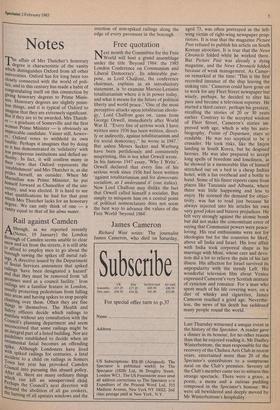Free quotation
Next month the Committee for the Free World will host a grand assemblage under the title 'Beyond 1984: the 1985 London Conference on Communism and Liberal Democracy'. Its admirable pur- pose, as Lord Chalfont, the conference chairman, explains in an introductory statement, is 'to examine Marxist-Leninist totalitarianism where it is in power today, and what it means for the future of political liberty and world peace.' One of the most perceptive attacks upon totalitarian ideolo- gy,' Lord Chalfont goes on, 'came from George Orwell, immediately after World War II. "Every line of serious work I have written since 1936 has been written, direct- ly or indirectly, against totalitarianism and for social democracy," he wrote in 1947.' But unless Messrs Secker and Warburg have been perfidiously and consistently misprinting, this is not what Orwell wrote. In his famous 1947 essay, 'Why I Write', Orwell declared that every line of his serious work since 1936 had been written 'against totalitarianism and for democratic socialism, as I understand it' (our italics). Now Lord Chalfont may dislike the fact that Orwell called himself a socialist. But simply to misquote him on a central point of political nomenclature does not seem the best way to advance the values of the Free World 'beyond 1984'.










































 Previous page
Previous page